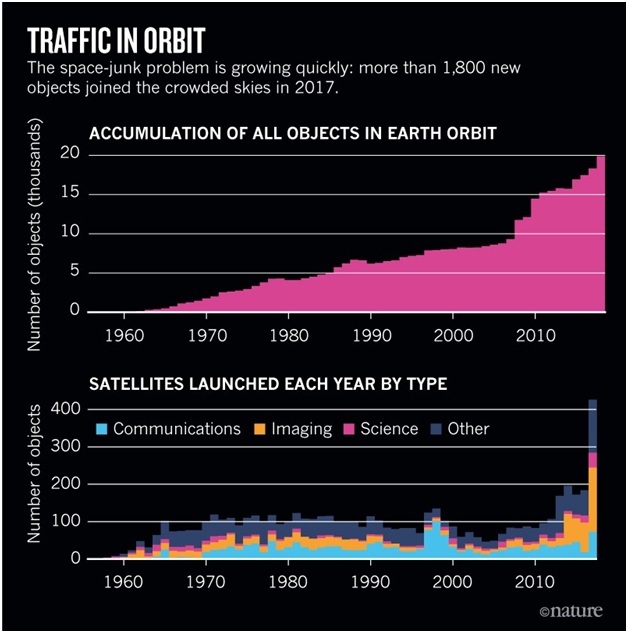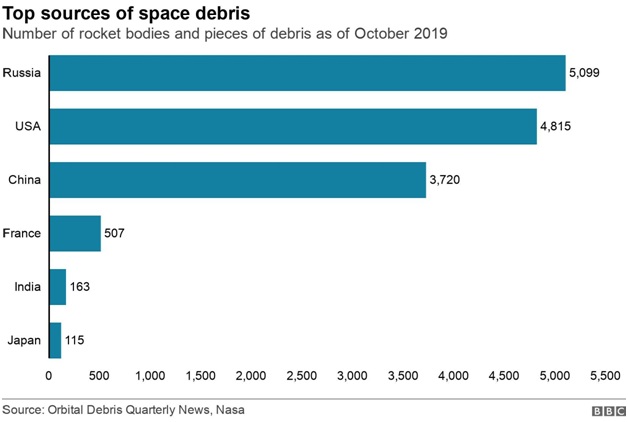

Context
Since the beginning of the space age in 1957, tonnes of rockets, spacecraft, and instruments have been launched into space. Initially, there was no plan for what to do with them at the end of their lives. Since then, numbers have continued to increase and explosions and collisions in space have created hundreds of thousands of shards of dangerous debris.
Analysis
What is Space Junk?
- Space debris is the thousands of fragments from old rocket parts or disintegrated satellites that litter space - principally in Earth's orbit.
- There are more than 23,000 pieces of debris larger than 10cm (4in) and the US Space Surveillance Network tracks most of them, according to Nasa's Orbital Debris Programme Office (ODPO).
- Most of that debris is zipping around within 1,250 miles of the Earth's surface, along with more than 2,000 artificial satellites, as well as the International Space Station.

Reasons for increasing junks
- The biggest contributor to the current space debris problem is explosions in orbit, caused by left-over energy – fuel and batteries – onboard spacecraft and rockets.

How much is India responsible for?
- India still produces much less space junk than the top three polluters: Russia, the US, and China, according to ODPO data.
- Indian-made space debris, however, is on the rise - from 117 pieces in 2018 to 163 in 2019.

What is being done to tackle space debris?
- Earth's orbit is becoming more congested, with thousands of satellites in operation and more launches planned, increasing the likelihood of a collision.
- But there is no regulation against these anti-satellite tests.
- Several countries, and some private companies, are testing new ways to mitigate space debris, ranging from harpoons, giant magnets, and nets.
- And in 2025, the European Space Agency will launch the first space mission to remove debris from Earth's orbit.
- But Nasa says cleaning up the space environment remains a "technical and economic challenge".
What are the current space regulations?
- Space law emerged soon after Sputnik 1 was launched into outer space in 1957.
- Several legally binding international instruments(treaties) governing the use of outer space for peaceful purposes have been adopted within the framework of the United Nations Committee on the Peaceful Uses of Outer Space (UNCOPUOS), with the 1967 Outer Space Treaty (OST) at its core.
UNCOPUOS (1958):
- The UNCOPUOS was established in 1958 as an ad hoc committee of the UN (later made permanent in 1959) with the UN Office for Outer Space Affairs (UNOOSA)as its secretariat.
- UNCOPUOS oversees the implementation of five UN treaties related to outer space activities, namely,
- Treaty on Principles Governing the Activities of States in the Exploration and Use of Outer Space, including the Moon and Other Celestial Bodies of 1967 (Outer Space Treaty)
- Agreement on the Rescue of Astronauts
- the Return of Astronauts and the Return of Objects Launched into Outer Space of 1968 (Rescue Agreement),
- Convention on International Liability for Damage Caused by Space Objects of 1972 (Liability Convention),
- Convention on Registration of Objects Launched into Outer Space of 1976 (Registration Convention)
- the Agreement Governing the Activities of States on the Moon and Other Celestial Bodies of 1979 (Moon Treaty)
- It also oversees other related international agreements like the
- Treaty Banning Nuclear Weapon Tests in the Atmosphere, in Outer Space, and Under Water (NTB) of 1963
- the Brussels Convention Relating to the Distribution of Programme–Carrying Signals Transmitted by Satellite (BRS) of 1979
Outer Space Treaty
- The OST contains the basic rules that define the behavior of States in conducting activities in outer space and has resulted in more than sixty years of peaceful cooperation in space that benefits humankind as a whole.
- The Treaty declares outer space “the province of mankind”.
- This means that its exploration and use shall benefit all countries, be without discrimination, and ensure free access to planets and other celestial bodies.
What is the present scenario of space security?
- Space security issues have potentially serious consequences. The consequences of either a deliberate or even an accidental conflict in space are too horrible to contemplate.
- A day without the utility provided by outer space is difficult to even conceive and yet the actions of states might lead the world in that direction sooner than later.
- Unless states take measures to restrain some kinds of activities in space, access to space will not be safe, secure, or guaranteed.
- Because of the highly competitive and contested nature of major power relations today, even peaceful applications and technological developments such as On-Orbit Satellite Servicing or technologies to tackle space debris are viewed with much suspicion.
- There are also more specific space security threats – the return of anti-satellite (ASAT) testing, and cyber and electronic warfare in space, for example.
- Any satellite service disruption or damage will have a wide-ranging impact, one that cannot be contained to the security or economic sectors alone, and one that cannot be limited geographically either given the significant global dependence on space.
- Space is truly a global commons.
What are the major threats to space?
Space security threats are growing. The major threats to the space are as follow:
- increasing cyber threats to space assets (through hacking and other satellite interference)
- heightened collision probability due to congestion
- the proliferation of space debris
- entry of new players merely to ensure deterrence
- visible early trends of weaponization of space
- Space is becoming more accessible
- the threat of overwhelming radiofrequency waves spectrum by large satellite constellations


